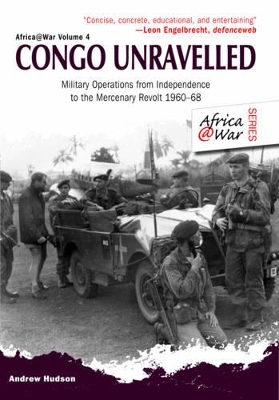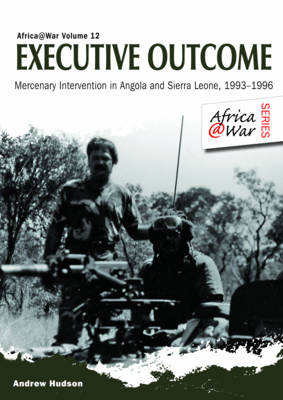Africa@War
2 total works
Post-independence events in the Republic of the Congo are a veritable Gordian knot. The ambitions of Congolese political leaders, Cold War rivalry, Pan-Africanism, Belgium's continued economic interests in the country's mineral wealth, and the strategic perceptions of other southern African states all conspired to wrack Africa's second largest country with uprisings, rebellions and military interventions for almost a decade.
Congo Unravelled solves the intractable complexity of this violent period by dispassionately outlining the sequence of political and military events that took place in the troubled country. The reader is systematically taken through the first military attempts to stabilise the country after independence and the two distinguishing military campaigns of the decade; the United Nations military operations to end the secession of the Katanga Province, and the Dragon Operations led by Belgian paratroopers, supported by the US Air Force, launched to end the insurgency in the east of the country. Finally, the mercenary revolt, an event that tainted the reputation of the modern mercenary in Africa, is described. Lesser known military events, such as the Irish UN forces cut off from the outside world by Katangese gendarmes and mercenaries, and a combined military operation in which Belgian paratroopers were dropped from US Air Force C-130 Hercules aircraft and supported by a mercenary ground force to achieve humanitarian ends, go far toward resolving the enigma surrounding post-independence Congo.
About the Author
Andrew Hudson majored in military history at the South Africa Military Academy and after two decades as an infantry officer in the South African Defence Force moved into the private sector. Still a soldier at heart he divides his time between earning an income, indulging his passion for collecting books on conflict in Africa, and road running in weird and wonderful locations.
Congo Unravelled solves the intractable complexity of this violent period by dispassionately outlining the sequence of political and military events that took place in the troubled country. The reader is systematically taken through the first military attempts to stabilise the country after independence and the two distinguishing military campaigns of the decade; the United Nations military operations to end the secession of the Katanga Province, and the Dragon Operations led by Belgian paratroopers, supported by the US Air Force, launched to end the insurgency in the east of the country. Finally, the mercenary revolt, an event that tainted the reputation of the modern mercenary in Africa, is described. Lesser known military events, such as the Irish UN forces cut off from the outside world by Katangese gendarmes and mercenaries, and a combined military operation in which Belgian paratroopers were dropped from US Air Force C-130 Hercules aircraft and supported by a mercenary ground force to achieve humanitarian ends, go far toward resolving the enigma surrounding post-independence Congo.
About the Author
Andrew Hudson majored in military history at the South Africa Military Academy and after two decades as an infantry officer in the South African Defence Force moved into the private sector. Still a soldier at heart he divides his time between earning an income, indulging his passion for collecting books on conflict in Africa, and road running in weird and wonderful locations.
The detritus of 20th-century conflict litters the African continent. Scars and irreparable destruction characterize both the physical and human dimensions of these bitter wars, reinforcing the stereotype that nothing good comes of war.
As the armed conflict in South Africa gravitated toward political accommodation and compromise, a group of highly skilled and experienced South African Defence Force soldiers, tempered by decades of success, and some failures, on the battlefields of South West Africa, Angola, Rhodesia and Mozambique found themselves out of political favour. In effect they became the human detritus of the political compromise that spawned the South Africa we know today. Unwanted, unrecognized and facing a static garrison life in the reconstituted South African military and police forces, these men, in the prime of their lives, opted rather to seek other opportunities where the application of their military skills and the associated life of adventure might continue.
The simmering conflicts in Angola and Sierra Leone offered two hitherto unavailable opportunities to the men to continue their warrior lifestyle and Executive Outcomes, the pioneering private security company of the late 20th century, was born. Vaunted as efficient force multipliers and heroes in the countries in which they fought, the men of Executive Outcomes faced stark accusations of treason and prosecution at home in South Africa.
An Executive Outcome casts the political rhetoric aside and focuses on a description of the major military operations undertaken by these men as they sought to rekindle the sense of achievement, the lift and exhilaration a soldier experiences during and after an engagement with the enemy, particularly at close quarters, which is and will always be unmatched in any other profession.
As the armed conflict in South Africa gravitated toward political accommodation and compromise, a group of highly skilled and experienced South African Defence Force soldiers, tempered by decades of success, and some failures, on the battlefields of South West Africa, Angola, Rhodesia and Mozambique found themselves out of political favour. In effect they became the human detritus of the political compromise that spawned the South Africa we know today. Unwanted, unrecognized and facing a static garrison life in the reconstituted South African military and police forces, these men, in the prime of their lives, opted rather to seek other opportunities where the application of their military skills and the associated life of adventure might continue.
The simmering conflicts in Angola and Sierra Leone offered two hitherto unavailable opportunities to the men to continue their warrior lifestyle and Executive Outcomes, the pioneering private security company of the late 20th century, was born. Vaunted as efficient force multipliers and heroes in the countries in which they fought, the men of Executive Outcomes faced stark accusations of treason and prosecution at home in South Africa.
An Executive Outcome casts the political rhetoric aside and focuses on a description of the major military operations undertaken by these men as they sought to rekindle the sense of achievement, the lift and exhilaration a soldier experiences during and after an engagement with the enemy, particularly at close quarters, which is and will always be unmatched in any other profession.

